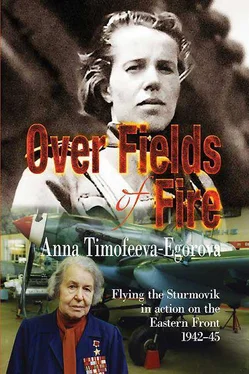“Let’s avenge the death of our comrades-in-arms — the two Ivans. Death to the Fascists! To your planes!”
Ivan Soukhoroukov led a group of the same size, following Gourkin, and I led the third one to attack the tanks. We destroyed the Hitlerites’ tank column, and every pass we made in that battle was dedicated to the memory of our comrades, who had made the supreme sacrifice for the liberation of the land of Poland…
The 1st Army of the Wojsko Polskie 156 156 Translator’s note — Polish Armed Forces fighting on the Soviet-German Front.
which had been formed on the basis of the Tadeusz Kosciuszko 157 157 Translator’s note — a Polish, Belorussian and American national hero, 1746-1817.
1st Polish Division, was initially raised in May 1943. The Polish National Liberation Committee was formed in the Polish City of Chežm, which we used to fly to for strafing and bombing. Following the liberation of the cities of Lublin and Dwblin our 6th Ground Attack Aviation Corps was given the honorary title ‘Lublinskiy’, while the 197th Ground Attack Aviation Division (which included our 805th regiment) — ‘Demblinskaya’.
One of Hitler’s death camps, Majdanek, where a million and a half women, children, elderly people and POWs had died, was located in Lublin. Delegations from many units visited Majdanek, and so did representatives of our regiment. We saw with our own eyes the gas chambers, in which the Hitlerite butchers had been exterminating people. I remember us entering long barracks and standing petrified: piles of children’s footware of different sizes lay in front of us, ladies’ handbags from the mothers killed with their children… I couldn’t hold back the sobs, and I wasn’t alone… When we returned to the regiment a meeting was summoned. At first all honoured the memory of the dead with a minute of silence, then my comrades made short speeches calling for the ruthless struggle against the enemy!
After completing the operation our regiment relocated. Now we were based near the Polish town of Parczew. The hostess of the apartment in which Dousya and I were billeted, Pani Juzefa, met us every day with a jug of milk. On the spot, on the doorstep, she would pour a glass for each of us and ask us to drink it. Then the host would appear — a tall and proud Pole in homespun clothes — and would also insist we drink it. It was impossible to refuse, the more so when our hosts treated us to big lumps of cottage cheese.
Once I came back from the aerodrome alone, and my hostess met me with frightened eyes: “ Matka Boska ! 158 158 Translator’s note — mother of God.
Virgin Mary! Where is Panenka 159 159 Translator’s note — little Miss.
Dousya?” she exclaimed in alarm.
“Dousya is delayed at the aerodrome. She’s the orderly at headquarters today”, I lied, trying not to look at the Polish woman.
Pani Juzefa began to blow her nose into her apron and hurriedly wipe her eyes, and crossed herself. As for me, I rushed out of the house — my heart was so unbearably heavy: that day Dousya Nazarkina did not make it back from a flight…
It so happened that our commissar (as we, in the old style, called our zampolit Shvidkiy) had flown on a combat mission in my plane, and taken my aerial gunner. The pilots with whom he had flown, and the group leader Berdashkevich, reported after returning form the mission that the commissar, not having reached the target, had turned away, and none had seen him since…
A plane was dispatched to search for them, but Shvidkiy and Nazarkina were not found. The next night they came back to the regiment — worn out but unharmed. It turned out that when they were approaching the target the Sturmovik ’s engine began to play up. Shvidkiy managed to turn the machine around and glide down to our territory. He landed the machine on a marsh near a lake. They barely got out of there… “Anna Alexandrovna!” Dousya appealed to me. “I only want to fly with you. Don’t give me away to anyone anymore!”
“Alright, Dousya, alright”, I calmed her. “Just don’t be angry at the Major. It could have happened to any pilot!”
But after the unsuccessful flight with the zampolit Dousya was clearly upset: “The regiment has people capable of flying combat missions. Let him deal with his ground stuff!”
I did not agree with her: from my point of view when a political officer flew himself, he could better understand a pilot’s soul and all the hardships of his work. There had been cases: a Sturmovik pilot returned from a mission, and not yet chilled out after combat, having suffered badly himself, losing a comrade, might commit some breach of discipline on the ground, make a simple blunder — and he would be slated! And how vexing it was for a pilot when the political officers couldn’t understand him and on top of that would give him instructions on flying techniques, knowing nothing about it! No, Dousya was wrong: our ground attack regiment was really lucky that our zampolit was a combat airman.
On 20 August 1944 we had no combat missions in the morning. By tradition we were going to celebrate our aviation holiday, Air Force Day, and Aerodrome Services Battalion Commander Belousov suggested we utilise Count Zheltowsky’s estate for this purpose. Just recently a conference of the pilots of our division and fighter pilots had taken place on this estate. They had discussed co-operation — providing cover to the Sturmoviks , mutual aid, tactical skills.
Adjusting his tunic with its two Orders of Lenin, our Division Commander Colonel V. A. Timofeev was first to take the floor: “We have analysed the combat operations of the regiments. It looks like we’ve lost more planes from the enemy’s anti-aircraft artillery fire than from their fighters. It happens this way because our crews make themselves ready to encounter with the enemy fighter planes, they know all their silhouettes, and the escort fighters help us properly during sorties. And yet we give in to the flak guns: the Sturmoviks are not always ready for their salvos. I reckon”, the comdiv 160 160 Translator’s note — division commander.
continued, “it is essential the pilots study before each sortie the enemy’s anti-aircraft defences around the targets. To do this Headquarters and the Operations Department must prepare intelligence data for the future target areas.”
Major P.T. Karev, acting as Regimental Commander after the death of M. N. Kozin, said that the escort fighters were always alert for the foe, beat off their attacks on Sturmoviks , and gave no quarter to the Messers or Focke-Wulfs. But there were times when they failed to guess the enemy’s intentions, engaged a diversionary group, and in the meantime another would pounce on the Sturmoviks with impunity…
I was given the floor as well, and as an example I told about the combat sortie of a sixer I had led to smash enemy materiel and manpower in the area of Pužawy. Whilst we were operating over the target making one pass after another, the escort fighters had been carried away in a dogfight against a group of Messerschmitts somewhere off to the side. We had already finished up and pulled away from the target when a pack of stalking Focke-Wulfs attacked us. We would have been in trouble if two La-5 fighters had not appeared. They struck at the Fokkers from above and attacked them with such determination that soon they shot down two of them, and two others trailed smoke and retired to their lines.
“As a woman”, I pointed out, “I feel uncomfortable asking men not to abandon me. And it’s even more annoying when they desert me!”
Читать дальше












